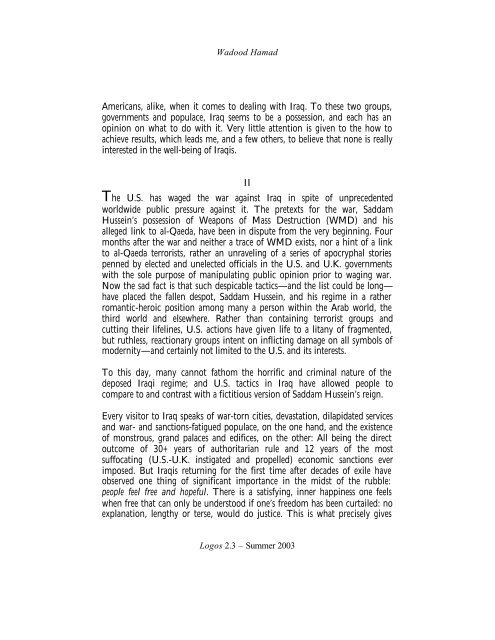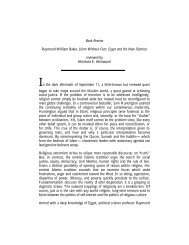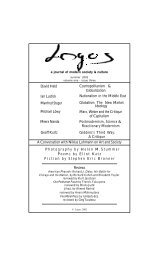Michael J. Thompson Stephen Eric Bronner Wadood Hamad - Logos
Michael J. Thompson Stephen Eric Bronner Wadood Hamad - Logos
Michael J. Thompson Stephen Eric Bronner Wadood Hamad - Logos
You also want an ePaper? Increase the reach of your titles
YUMPU automatically turns print PDFs into web optimized ePapers that Google loves.
<strong>Wadood</strong> <strong>Hamad</strong><br />
Americans, alike, when it comes to dealing with Iraq. To these two groups,<br />
governments and populace, Iraq seems to be a possession, and each has an<br />
opinion on what to do with it. Very little attention is given to the how to<br />
achieve results, which leads me, and a few others, to believe that none is really<br />
interested in the well-being of Iraqis.<br />
II<br />
The U.S. has waged the war against Iraq in spite of unprecedented<br />
worldwide public pressure against it. The pretexts for the war, Saddam<br />
Hussein’s possession of Weapons of Mass Destruction (WMD) and his<br />
alleged link to al-Qaeda, have been in dispute from the very beginning. Four<br />
months after the war and neither a trace of WMD exists, nor a hint of a link<br />
to al-Qaeda terrorists, rather an unraveling of a series of apocryphal stories<br />
penned by elected and unelected officials in the U.S. and U.K. governments<br />
with the sole purpose of manipulating public opinion prior to waging war.<br />
Now the sad fact is that such despicable tactics—and the list could be long—<br />
have placed the fallen despot, Saddam Hussein, and his regime in a rather<br />
romantic-heroic position among many a person within the Arab world, the<br />
third world and elsewhere. Rather than containing terrorist groups and<br />
cutting their lifelines, U.S. actions have given life to a litany of fragmented,<br />
but ruthless, reactionary groups intent on inflicting damage on all symbols of<br />
modernity—and certainly not limited to the U.S. and its interests.<br />
To this day, many cannot fathom the horrific and criminal nature of the<br />
deposed Iraqi regime; and U.S. tactics in Iraq have allowed people to<br />
compare to and contrast with a fictitious version of Saddam Hussein’s reign.<br />
Every visitor to Iraq speaks of war-torn cities, devastation, dilapidated services<br />
and war- and sanctions-fatigued populace, on the one hand, and the existence<br />
of monstrous, grand palaces and edifices, on the other: All being the direct<br />
outcome of 30+ years of authoritarian rule and 12 years of the most<br />
suffocating (U.S.-U.K. instigated and propelled) economic sanctions ever<br />
imposed. But Iraqis returning for the first time after decades of exile have<br />
observed one thing of significant importance in the midst of the rubble:<br />
people feel free and hopeful. There is a satisfying, inner happiness one feels<br />
when free that can only be understood if one’s freedom has been curtailed: no<br />
explanation, lengthy or terse, would do justice. This is what precisely gives<br />
<strong>Logos</strong> 2.3 – Summer 2003




